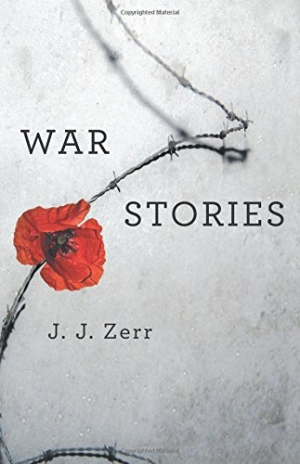
War Stories
J. J. Zerr has created a jumping-off point for anyone interested in the complexities of warfare, both at home and abroad.
J. J. Zerr’s War Stories examines the multifaceted definition of war in a unique way that most collections skip over in favor of details of conflict. With intense, sometimes humorous tales, longtime author Zerr has carved out a niche in the war story subgenre, covering characters who face challenges of both combat and everyday life.
War comes in many forms, which becomes evident in the twelve short works in War Stories. While drawing on his own experiences to create some of the fictitious short stories, Zerr also examines the complexities of other, less-analyzed instances of war, like the private struggles between a husband and wife in “The Face in the Mirror” or the battle of grade-school crushes in “The Short, Happy Love Life of Heiny Bauer.” Each character, whether told in first or third person, is written with a distinct voice, allowing the book to truly center on people first, then delve into the struggles they endure.
The collection opens with “What Kind of Man Are You?,” in which a pilot, Joe Bob, tries to differentiate the “what” and “who” of his professional and personal identity. The suicide of his father, a veteran pilot, instigates a search for meaning in his time as a lieutenant in the navy, where he was first tasked with looking after young recruits as their flight deck officer. While initially finding this a dull job, Joe Bob ultimately softens and faces the subsequent grief of embracing his humanity, which he carries through each additional position in the navy that he recounts. Intimate portraits like these that are grounded in compassion are signature to Zerr and his special brand of storytelling that manages to string together each seemingly unrelated tale within the book.
One of the standout pieces is “The Free Upgrade.” A man in a hospital witnesses the startling juxtaposition between his unspecified, anger-caused injuries and what he calls the “much worser” damages of a nonchalant teenager’s skateboarding accident. The story, which is centered on a “bad day,” packs a punch somewhat different from the other pieces in the collection, as the narrator becomes more and more difficult to empathize with.
Another highlight of the collection is “Voices,” the final short story in the book. “Voices have always swirled around—yours, theirs, his, hers, mine,” the narrator says. “It’s the first-person, plural possessive pronoun I have trouble hooking onto the word voice. Our voice.” While the story deals with very concrete details of the narrator’s thirty-six years in the navy, this abstract exploration of “voice” captures the essence and ingenuity of War Stories in a lyrical, almost poetic way.
Zerr, a seasoned war veteran, took his own intimate knowledge of war and made it so anybody could connect with the characters and their individual war stories, whether traditional combat or the quiet battles in everyday life. The power of the book lies within the details of the dozen stories, which feature the kind of specifics usually only found in nonfiction.
War Stories has an ability to truly “show” a narrative in a way that lingers long after the story ends. A solid addition to the war stories genre, Zerr has created a jumping-off point for anyone interested in the complexities of warfare, both at home and abroad.
Reviewed by
Lillian Brown
Disclosure: This article is not an endorsement, but a review. The publisher of this book provided free copies of the book and paid a small fee to have their book reviewed by a professional reviewer. Foreword Reviews and Clarion Reviews make no guarantee that the publisher will receive a positive review. Foreword Magazine, Inc. is disclosing this in accordance with the Federal Trade Commission’s 16 CFR, Part 255.
